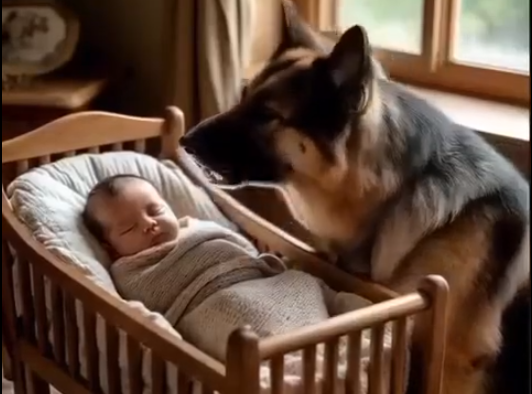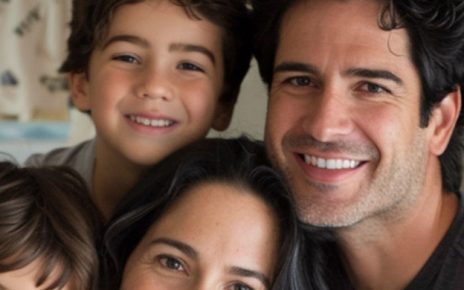We almost gave the dog away.
We’d had Bramble since she was a puppy — a shaggy, quiet German Shepherd with a big heart and sad eyes. When our daughter Willa was born, we expected Bramble to be protective, maybe a little jealous. What we didn’t expect was… aggression.
It started subtly. Around three weeks in, we’d find Bramble pacing outside Willa’s room at night, ears up, tail stiff. Then we caught her slipping into the nursery and climbing into Willa’s crib. She’d hover over the baby, stiff-legged, eyes locked.
It looked wrong. Tense. Like she was about to pounce.
I snapped a photo one night because I couldn’t believe what I was seeing. When I showed my husband, Arlen, his jaw tightened. “We can’t keep her in the house anymore, Sera.”
I agreed. I didn’t want to wait until something awful happened. That night, we moved Willa’s crib into our room and blocked off Bramble’s access. She whined outside our door all night.
But something kept bothering me — she never growled, never snapped. She never even touched the baby. Just… stood there. Watching.
Two nights later, Willa was extra fussy. Nothing soothed her. Her little face was red from crying, and I was losing my patience. Then suddenly, Bramble scratched frantically at the door, barking sharply.
I opened it, ready to scold her.
She shoved past me, jumped onto the bed, and once again loomed over Willa — this time barking directly at her chest.
That’s when I saw it. Willa’s tiny lips had turned slightly blue.
We rushed to the ER. Turns out she’d stopped breathing — only partially — due to a rare form of infant sleep apnea. She’d been doing it in small spells for weeks. The doctors said we were incredibly lucky.
The spells always happened at night.
And Bramble… she’d known.
The “threatening” behavior was her alert system. Her way of trying to save Willa. Every single night.
We never blocked her out again.
We bought a special monitor, enrolled in infant care training, and yes — Bramble sleeps right next to the crib now, head up, always watching. Just in case.
At first, I thought that would be the end of it. The big twist, the shocking reveal. But Bramble had more to show us.
A month later, Willa’s apnea was under control with a CPAP machine and regular monitoring. Bramble seemed more relaxed, though she still refused to leave Willa’s side at night.
Then something strange happened.
During a routine pediatric appointment, the doctor paused mid-checkup and furrowed his brow.
“Has Willa been unusually still in her sleep?” he asked.
“She’s been sleeping better,” I said. “Less restlessness, actually.”
He nodded slowly. “Well… I just want to double-check something.”
He ordered an echocardiogram. Long story short: it turned out Willa had a small congenital heart defect. Not dangerous if managed, but something that should’ve been picked up at birth. Something that could’ve explained her apnea — and might’ve gotten worse if not caught early.
Arlen and I just sat there, stunned.
And I couldn’t stop thinking about Bramble. That dog had sensed everything before any of us. Not just the apnea — something deeper.
We ended up talking to a vet who specialized in canine behavior. She explained how some dogs, especially those closely bonded with a person, can pick up on chemical or physiological changes. Apparently, it wasn’t uncommon in trained medical alert dogs.
“But we didn’t train her,” I said.
The vet smiled. “She trained herself.”
Fast forward to today. Willa’s a chubby, giggling toddler. Bramble’s getting older — slower, a little gray around the muzzle. But every night, she still pads over to Willa’s bed and rests her head beside her.
It’s become their ritual. One I’ll never take for granted again.
And the bond between them? It’s unshakable. Willa learned to walk by holding onto Bramble’s back. She says “Bramby” before she says “Mama.” And sometimes, when Willa’s playing outside and scrapes her knee, Bramble’s the first one she runs to.
People used to ask us why we never got rid of the dog after that first incident. I show them the photo I snapped that night — Bramble standing over the crib like a soldier on guard. I used to think it looked threatening. Now I see it for what it really was: fierce devotion.
LIFE LESSON? Sometimes the people—or animals—we misunderstand the most are the ones trying hardest to protect us. We just have to look closer. Listen better. Trust deeper.
If this story warmed your heart even a little, share it with someone who loves their pets like family.
Like and comment if you’ve ever felt a bond that went beyond words.




